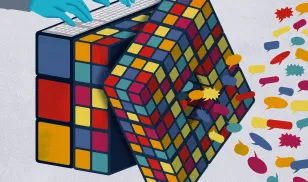


Belarus
Belarus is an authoritarian state in which elections are openly rigged and civil liberties are severely restricted. Security forces have violently assaulted and arbitrarily detained journalists and ordinary citizens who challenge Alyaksandr Lukashenka's regime. The judiciary and other institutions lack independence and provide no check on Lukashenka’s power.
Research & Recommendations
Belarus
| PR Political Rights | 1 40 |
| CL Civil Liberties | 6 60 |
Overview
Belarus is an authoritarian state in which elections are openly rigged and civil liberties are severely restricted. Security forces have violently assaulted and arbitrarily detained journalists, activists, and ordinary citizens who challenge the regime. The judiciary and other institutions lack independence and provide no check on President Alyaksandr Lukashenka’s power.
In countries where democratic forces have come to power after periods of antidemocratic rule, the new governments should pursue an agenda that protects and expands freedoms even as it delivers tangible economic and social benefits to citizens.
These countries must act swiftly to release all political prisoners, build or revitalize democratic institutions, reform police and other security forces, organize and hold competitive multiparty elections, and ensure accountability for past human rights violations.
In countries where there has been significant erosion of political rights and civil liberties, policymakers, legislators, jurists, civic activists, and donor communities should work to strengthen institutional guardrails and norms that serve to constrain elected leaders with antidemocratic or illiberal aims.
Belarus
| A Obstacles to Access | 12 25 |
| B Limits on Content | 5 35 |
| C Violations of User Rights | 3 40 |
Political Overview
Belarus is an authoritarian state in which elections are openly rigged and civil liberties are severely restricted. Security forces have violently assaulted and arbitrarily detained journalists, activists, and ordinary citizens who challenge the regime. The judiciary and other institutions lack independence and provide no check on President Alyaksandr Lukashenka’s power.
Freedom of expression online has been and is increasingly under attack as governments shut off internet connectivity, block social media platforms, and restrict access to websites that host political, social, and religious speech. Protecting freedom of expression will require strong legal and regulatory safeguards for digital communications.
Governments should encourage a whole-of-society approach to fostering a high-quality, diverse, and trustworthy information space. The Global Declaration on Information Integrity Online identifies best practices for safeguarding the information ecosystem, to which governments should adhere.
Comprehensive data-protection regulations and industry policies on data protection are essential for upholding privacy and combating disproportionate government surveillance, but they require careful crafting to ensure that they do not contribute to internet fragmentation—the siloing of the global internet into nation-based segments—and cannot be used by governments to undermine privacy and other fundamental freedoms.
Belarus
| DEMOCRACY-PERCENTAGE Democracy Percentage | 1.79 100 |
| DEMOCRACY-SCORE Democracy Score | 1.11 7 |
Executive Summary
The political and human rights crisis in Belarus worsened in 2023. The authorities continued to stifle civil society voices that have demanded democracy. Under President Alyaksandr Lukashenka’s authoritarian rule, arbitrary arrests, politically motivated prosecutions, surveillance, censorship, and intimidation have become the new reality. Some of the violations committed in the years since the government’s 2020 crackdown on protests against Lukashenka’s continued rule, including in 2023, could be considered crimes against humanity.
The future of European democracy and security is now inextricably linked to the fate of Ukraine. European Union (EU) and NATO member states must not only invest far more—and more efficiently—in their collective defense, but also provide Ukraine with the assistance it needs to roll back Russian advances and build a durable democracy of its own.
In addition to defending the international order from emboldened autocrats, democratic governments must attend to democratic renewal within Europe, particularly among nascent democracies.
Military aggression from autocracies in the region has underscored the dangers of exclusion from democracy-based organizations like the EU and NATO, galvanizing the political will of policymakers in aspiring member states and generating further public pressure to undertake long-sought democratic reforms.

Election Watch for the Digital Age equips technology companies, civil society organizations, and policymakers with a data-driven resource for evaluating the human rights impact of internet platforms on a country’s electoral process.
Our Election Vulnerability Index consists of key election-related indicators regarding a country’s political rights and internet freedom. Derived from our annual Freedom in the World and Freedom on the Net reports, the data and accompanying analysis allows users to identify specific areas of concern ahead of a country’s election, including online influence operations, internet shutdowns, or intercommunal tensions fanned by social media.





